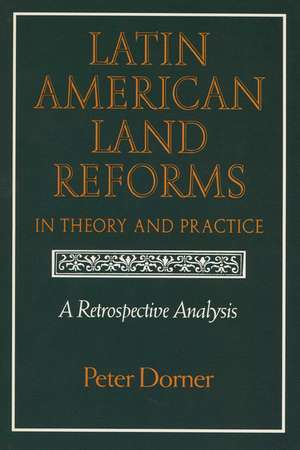Latin American Land Reforms: A Retrospective Analysis
Autor Peter Dorneren Limba Engleză Paperback – 14 ian 1992
Surveying three decades of land reform efforts in Latin America, Peter Dorner draws upon his broad experience as both a policy maker and a researcher specializing in land tenure systems. He argues that the failures of Latin American land reforms are due to a lack of political will and commitment exacerbated by inadequate capital resources.
Avoiding polemics, Dorner evaluates the many competing theoretical and ideological positions in the ongoing debates over land reform, from structuralist economics to liberation theology. He then looks at a range of actual reform experiences, including local peasant initiatives and international aid projects. Emphasizing the growing complexity of Latin American economies, Dorner demonstrates that solutions successful in one country may fail in another. He concludes that aid and political pressure from the international community can play only a peripheral role. Recognizing that change must come from within, Latin American countries must develop multifaceted approaches to meet objectives based on their own individual experiences.
Dorner warns that “romantic” expectations for future land reform relying on any one solution will continue to lead to disillusionment. If opportunities for the landless population were actually a top priority of governments and power-brokers, Dorner believes, they could be achieved through agrarian reform policies that set clear goals and criteria for implementation. Nevertheless, the potential gains from such a program are, in most cases, more limited now than thirty years ago.
Avoiding polemics, Dorner evaluates the many competing theoretical and ideological positions in the ongoing debates over land reform, from structuralist economics to liberation theology. He then looks at a range of actual reform experiences, including local peasant initiatives and international aid projects. Emphasizing the growing complexity of Latin American economies, Dorner demonstrates that solutions successful in one country may fail in another. He concludes that aid and political pressure from the international community can play only a peripheral role. Recognizing that change must come from within, Latin American countries must develop multifaceted approaches to meet objectives based on their own individual experiences.
Dorner warns that “romantic” expectations for future land reform relying on any one solution will continue to lead to disillusionment. If opportunities for the landless population were actually a top priority of governments and power-brokers, Dorner believes, they could be achieved through agrarian reform policies that set clear goals and criteria for implementation. Nevertheless, the potential gains from such a program are, in most cases, more limited now than thirty years ago.
Preț: 103.06 lei
Nou
Puncte Express: 155
Preț estimativ în valută:
19.72€ • 20.64$ • 16.32£
19.72€ • 20.64$ • 16.32£
Carte tipărită la comandă
Livrare economică 05-19 aprilie
Preluare comenzi: 021 569.72.76
Specificații
ISBN-13: 9780299131647
ISBN-10: 0299131645
Pagini: 118
Dimensiuni: 152 x 229 x 8 mm
Greutate: 0.18 kg
Ediția:New.
Editura: University of Wisconsin Press
Colecția University of Wisconsin Press
ISBN-10: 0299131645
Pagini: 118
Dimensiuni: 152 x 229 x 8 mm
Greutate: 0.18 kg
Ediția:New.
Editura: University of Wisconsin Press
Colecția University of Wisconsin Press
Notă biografică
Peter Dorner is professor emeritus of agricultural economics and dean emeritus of international studies and programs at the University of Wisconsin–Madison. He has served as a consultant to international agencies and on President Johnson’s Council of Economic Advisors. His books include Land Reform in Latin America, Land Reform and Economic Development, Cooperative and Commune, and Resources and Development.
Descriere
Surveying three decades of land reform efforts in Latin America, Peter Dorner draws upon his broad experience as both a policy maker and a researcher specializing in land tenure systems. He argues that the failures of Latin American land reforms are due to a lack of political will and commitment exacerbated by inadequate capital resources.
Avoiding polemics, Dorner evaluates the many competing theoretical and ideological positions in the ongoing debates over land reform, from structuralist economics to liberation theology. He then looks at a range of actual reform experiences, including local peasant initiatives and international aid projects. Emphasizing the growing complexity of Latin American economies, Dorner demonstrates that solutions successful in one country may fail in another. He concludes that aid and political pressure from the international community can play only a peripheral role. Recognizing that change must come from within, Latin American countries must develop multifaceted approaches to meet objectives based on their own individual experiences.
Dorner warns that “romantic” expectations for future land reform relying on any one solution will continue to lead to disillusionment. If opportunities for the landless population were actually a top priority of governments and power-brokers, Dorner believes, they could be achieved through agrarian reform policies that set clear goals and criteria for implementation. Nevertheless, the potential gains from such a program are, in most cases, more limited now than thirty years ago.
Avoiding polemics, Dorner evaluates the many competing theoretical and ideological positions in the ongoing debates over land reform, from structuralist economics to liberation theology. He then looks at a range of actual reform experiences, including local peasant initiatives and international aid projects. Emphasizing the growing complexity of Latin American economies, Dorner demonstrates that solutions successful in one country may fail in another. He concludes that aid and political pressure from the international community can play only a peripheral role. Recognizing that change must come from within, Latin American countries must develop multifaceted approaches to meet objectives based on their own individual experiences.
Dorner warns that “romantic” expectations for future land reform relying on any one solution will continue to lead to disillusionment. If opportunities for the landless population were actually a top priority of governments and power-brokers, Dorner believes, they could be achieved through agrarian reform policies that set clear goals and criteria for implementation. Nevertheless, the potential gains from such a program are, in most cases, more limited now than thirty years ago.
